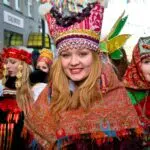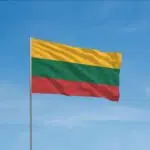Maslenitsa Week is celebrated a week before the Great Lent commences and lasts for seven days. This year, it takes place from February 16 to 22. This auspicious occasion of indulgence, better known as Butter Week, is a folk holiday observed in Slavic countries of Russia, Belarus, and Ukraine. The holiday honors the arrival of Spring after the long stretch of winter. Being the oldest Slavic holiday, Maslenitsa Week continues to bring observers together for a feast of pancakes, butter-filled sweets, and religious merriment. The holiday was not observed officially for the lifespan of the Soviet Union.
History of Maslenitsa Week
Maslenitsa Week is the oldest surviving Christian Holiday in the Slavic countries and is celebrated on the week before Lent. The origins of the observation can be traced back to the 2nd century. After a brief pause in public celebrations during the height of the Soviet hegemony, the observation recovered its religious reverence and old glory in the post-USSR era. Russians mark the celebration by wearing cultural costumes, eating bliny, and dancing to folk music. There’s a huge demand for buttered food during the celebration as well.
Maslenitsa Week celebrations are broken down into seven days, with each one dedicated to unique activities. The festival begins with a common evening feast on day one. On the second day, Russians partake in snow sledding and elders of the households take a walk in the snow. The third day is reserved for preparing a sweet meal, followed by cross-country skiing on the fourth day. The fifth-day honors mothers and mothers-in-law, and the final two days of the week mark the end of winter with snow sports and the burning of Maslenitsa effigy. Maslenitsa Week celebrations take from both Pagan and Christian traditions. According to the Christian Orthodoxy, the consumption of meat is already forbidden by Shrovetide week; eggs and dairy, however, are not. Thus, crepe week utilizes the last week they can consume the ingredients that make up the holiday’s delicacies.
Most traditions during Maslenitsa Week revolve around food. It is said that one must fill their bellies and their hearts with scrumptious food before the sacrificial weeks of Lent commence. Modern-day observers lean more into the cultural aspects of the holiday, which include preparing indulgent meals at home and eating them with friends and family. The days of the week often end with folk dances in community gardens.
Maslenitsa Week timeline
Archeologists recover the texts detailing Maslenitsa Week, the oldest Christian tradition observed by Slavic Christians.
Russian painter Vasily Surikov paints a picture of a snow sledding tournament during Maslenitsa Week.
After centuries of religious repression, Slavic strongholds recommence the celebratory observation of Maslenitsa Week.
Eurovision runner-ups, the iconic Buryanovsky Grannies, perform at the seafront celebrations of the Maslenitsa Week festival.
Maslenitsa Week FAQs
Is Maslenitsa a religious festival?
Maslenitsa Week is a cultural holiday with roots in Pagan and Christian times, celebrated by most Russians and Ukrainians a week before Lent.
What is the significance of Lady Maslenitsa?
Lady Maslenitsa represents the end of cold winds and isolation in Russia, Belarus, and Ukraine.
What is the significance of pancakes in Maslenitsa?
Pancakes, bliny, and other sweet dishes are of major importance during Maslenitsa Week, which is all about indulgences before the sacrificial week of Lent commences.
Maslenitsa Week Activities
Eat Russian pancakes
There’s nothing special about bliny or Russian pancakes, per se, but they are what the locals eat when celebrating Maslenitsa Week. You should try loading up on these smooth, rich, and buttery pancakes for lunch, breakfast, and dinner for at least one day. You can also indulge in other delicacies like pierogi and syrniki for a complete Maslenitsa experience.
Burn an effigy
On the final day of Maslenitsa, a straw-stuffed effigy that resembles Lady Maslenitsa is burned in the public. People rejoice around the burning ground and throw pancakes at the figure as a symbol of the “dying” winter. You can emulate the experience by gathering your past belongings and torching them as symbolism for “moving on.”
Observe Lent
The festivities of Maslenitsa Week should not take away from the fact the week is only a precursor for Lent. The Slavic descendants believed in entering the holy month of Lent by satiating their hearts and stomachs with delicious indulgences. To bear the fruits of sacrifice, we encourage you to observe Lent after Maslenitsa Week.
5 Beautiful Traditions Practiced During Maslenitsa Week
The community dance
Russians gather around and dance to folk songs.
The grand effigy is flamed
An effigy made of hay and straws is burned to bid goodbye to the spell of winter and the mistakes of our past.
Open market pancakes
Pancakes are baked in the open, and everyone is encouraged to eat them until they are full.
The children’s choir
Young Russians get on the stage and perform school poems for the crowd.
Road shows and presentations
Local artisans present their artwork on the road and merriment ensues on the streets of small Russian towns.
Why We Love Maslenitsa Week
It represents the end of winter
Russians and other Eastern European countries bear the inhumanity of winter for months on end before a single ray of sunshine is bestowed upon them. Maslenitsa Week is a beautiful reminder that seasons change, and spring is just around the corner.
It is a celebration of traditional food
Maslenitsa Week is all about eating traditional food. The entire week is an unending feast in and outside of homes. It is the week of subtle and divine flavors and is remembered fondly throughout the year.
It’s an important part of Slavic culture
Maslenitsa is the oldest continuing Slavic holiday. Its celebration is thus important to the preservation of Slavic culture.
Maslenitsa Week dates
| Year | Date | Day |
|---|---|---|
| 2024 | March 11–17 | Monday–Sunday |
| 2025 | February 24–March 2 | Monday–Sunday |
| 2026 | February 16–22 | Monday–Sunday |






















